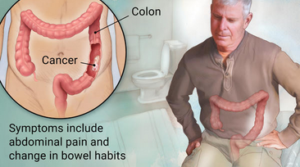The discomfort of colonoscopy is miniscule to the suffering of terminal colon cancer
 It’s been said “We are what we eat,” or “garbage in garbage out.” Less catchy advice might be “Eat an anti-inflammatory diet, rather than a pro-inflammatory one.” It could make the difference in the likelihood of developing a malignancy of the large bowel. Not many people realize that if you take away skin cancers, colon cancer is the third most common malignancy in North America.
It’s been said “We are what we eat,” or “garbage in garbage out.” Less catchy advice might be “Eat an anti-inflammatory diet, rather than a pro-inflammatory one.” It could make the difference in the likelihood of developing a malignancy of the large bowel. Not many people realize that if you take away skin cancers, colon cancer is the third most common malignancy in North America.
A study in the Journal of the American Medical Association, Oncology, points out a strong association between chronic inflammation and the risk of colon cancer.
Researchers at Harvard University discovered that people who had dietary patterns that triggered chronic inflammation were 32 percent more likely to develop colon cancer than those who followed a lowered inflammatory diet.
Diets with the lowest level of inflammatory potential were tea, coffee, dark yellow vegetables, dark and leafy greens
Dr. Joel Mason, Director of the Vitamins and Carcinogenesis Laboratory, Tufts University, says, “This study adds to previous evidence that inflammation is an important factor in colon cancer and that a diet with less potential to cause inflammation can decrease the risk.”
How did Harvard researchers determine what foods were associated with inflammation and what foods fought it?
They analyzed the health and nutrition habits of 120,000 people over a 26-year period. This involved 18 food groups and tracking how they affected inflammatory markers in the blood.
Diets with the lowest level of inflammatory potential were tea, coffee, dark yellow vegetables, dark and leafy greens. In contrast, diets with the highest level of inflammation included processed meat, red meat and sugar-sweetened carbonized beverages.
Overweight or obese males did not fare well. They were 48 percent more likely to develop cancer of the colon over the course of the study than those who consumed a low inflammatory diet. But even lean males were at higher risk, although not as much as the obese ones.
What about women? It’s strange that being overweight or obese did not increase or decrease the risk of colon malignancy in females. But in lean women who had the most pro-inflammatory diet, there was a 31 percent greater risk of colon cancer than those who consumed the least inflammatory diet. Researchers were not certain if these findings were related to hormonal changes in women.
North Americans are needlessly dying from colon cancer due to a fear of having a colonoscopy performed
So, what’s the message? It pays dividends to stay active and not gain weight. This is not the first time nutritionists have told us that leafy green vegetables are more conducive to a longer life and it’s prudent to decrease the amount of red meat consumed. Hopefully it will help make everyone realize that the use of sugar sweetened beverages is not a healthy habit.
An equally strong message remains that North Americans are needlessly dying from colon cancer due to a fear of having a colonoscopy performed.
We know that colon cancer begins in a polyp that remains localized, providing ample time for colonoscopy and removable of this lesion. This procedure should be done regularly starting at 50 years of age or younger, and usually ending at 75 years. Discuss with your doctor whether this is the age for you to end colonoscopy.
If several colonoscopies have been done over the years without any polyps being detected, the decision is usually to stop. The reason being that it’s unlikely one will form after the age of 75 and if it does some other event will end life long before a slow growing polyp causes trouble.
The discomfort of colonoscopy is miniscule to the suffering of terminal colon cancer. For those dead set against the procedure, stool card tests done at home are an option. So, never, never, fall into the trap of skipping these life-saving test
Written by W. Gifford-Jones, MD and Diana Gifford-Jone for Canada Free Press ~ May 30, 2021

